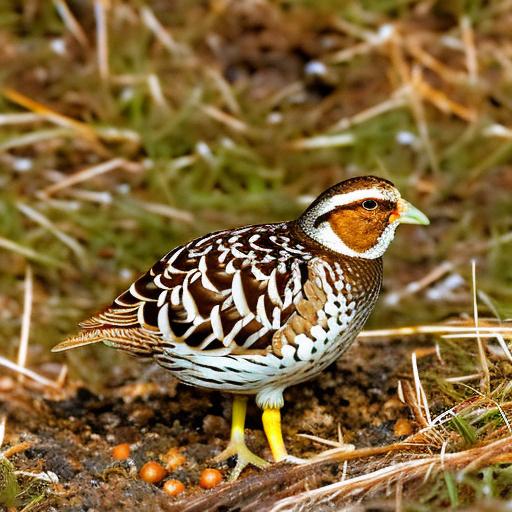When it comes to choosing the right breed of Coturnix quail, there are a few factors to consider. First and foremost, you’ll want to think about your specific goals for raising quail. If you’re primarily interested in quail for their eggs, you may want to consider breeds that are known for their high egg production. On the other hand, if you’re interested in raising quail for meat, you’ll want to look for breeds that are known for their large size and fast growth rate.
Some popular breeds of Coturnix quail include the Pharaoh, Texas A&M, and Italian. The Pharaoh quail is known for its hardiness and adaptability, making it a great choice for beginners. The Texas A&M quail is prized for its high egg production, making it a popular choice for those interested in egg production. The Italian quail is known for its large size and is often raised for meat production.
It’s also important to consider the availability of the breed in your area. Some breeds may be more readily available than others, so it’s worth doing some research to see what breeds are commonly raised in your region. Additionally, you may want to consider the temperament of the breed, especially if you plan to raise quail as pets. Some breeds may be more docile and friendly than others, so it’s worth considering your preferences in this regard as well.
Key Takeaways
- When choosing a breed of Coturnix quail, consider factors such as egg production, temperament, and color variations.
- Provide a spacious and well-ventilated coop for Coturnix quail, with nesting boxes and perches for roosting.
- Feed Coturnix quail a balanced diet of commercial quail feed, supplemented with fresh greens and protein sources.
- Understand the factors that affect quail egg production, such as age, lighting, and stress levels.
- Monitor the health of Coturnix quail and implement disease management practices, such as regular cleaning and quarantine procedures.
- Collect quail eggs daily and store them in a cool, dry place to maintain freshness and quality.
- Maximize quail egg production by providing a stress-free environment, proper lighting, and regular egg collection.
Housing and Coop Requirements for Coturnix Quail
When it comes to housing and coop requirements for Coturnix quail, there are a few key considerations to keep in mind. First and foremost, you’ll want to ensure that your quail have enough space to move around comfortably. As a general rule of thumb, you’ll want to provide at least 1 square foot of space per quail. This means that if you plan to raise 20 quail, you’ll need a coop that is at least 20 square feet in size.
In addition to providing enough space, you’ll also want to ensure that your coop is well-ventilated and provides protection from the elements. Quail are sensitive to temperature extremes, so it’s important to provide adequate ventilation to prevent overheating in the summer and ensure that your quail stay warm in the winter. Additionally, you’ll want to provide protection from predators, as quail are vulnerable to attacks from predators such as raccoons, foxes, and birds of prey.
It’s also important to provide nesting boxes for your quail, as well as perches or platforms for them to roost on. Nesting boxes should be filled with clean bedding material such as straw or wood shavings, and should be placed in a quiet, secluded area of the coop to provide your quail with a sense of security. Finally, you’ll want to ensure that your coop is easy to clean and maintain, as good hygiene is essential for keeping your quail healthy and disease-free.
Feeding and Nutrition for Coturnix Quail
Feeding and nutrition are crucial aspects of raising healthy and productive Coturnix quail. Quail require a balanced diet that provides them with the essential nutrients they need to thrive. A good quality commercial quail feed is a great foundation for their diet. Look for a feed that is specifically formulated for quail and provides the right balance of protein, vitamins, and minerals.
In addition to commercial feed, quail can also benefit from supplemental treats such as mealworms, fruits, and vegetables. These treats can provide additional nutrients and help keep your quail engaged and entertained. It’s important to remember that treats should only make up a small portion of your quail’s diet, with the majority of their nutrition coming from their commercial feed.
It’s also important to provide your quail with access to clean, fresh water at all times. Quail can be quite messy when it comes to water, so it’s important to provide water in a way that prevents it from becoming contaminated with droppings or bedding material. Consider using nipple drinkers or shallow dishes that are easy to clean and refill.
Finally, it’s important to monitor your quail’s body condition and adjust their diet as needed. If you notice that your quail are becoming overweight or underweight, you may need to adjust their feed intake accordingly. Additionally, if you’re raising quail for egg production, you may want to consider feeding them a higher protein diet during the laying season to support their increased nutritional needs.
Understanding Quail Egg Production
Quail egg production is a key aspect of raising Coturnix quail, whether for personal consumption or commercial purposes. Understanding the factors that influence egg production can help you maximize the productivity of your quail flock. Quail typically begin laying eggs at around 6-8 weeks of age, and can continue laying consistently for up to 1-2 years.
There are several factors that can influence egg production in quail. Nutrition plays a crucial role in egg production, so it’s important to ensure that your quail are receiving a balanced diet that meets their nutritional needs. In addition to nutrition, factors such as day length, temperature, and stress levels can also impact egg production. Providing your quail with a consistent environment with access to natural light can help support consistent egg laying.
It’s also important to provide your quail with comfortable nesting boxes filled with clean bedding material. This will help encourage your quail to lay their eggs in a designated area, making it easier for you to collect them. Additionally, providing your quail with a stress-free environment can help support healthy egg production. Minimizing disturbances and providing a calm and quiet environment can help keep your quail content and productive.
Finally, it’s important to monitor your quail’s egg production and address any issues promptly. If you notice a sudden drop in egg production or any abnormalities in the eggs themselves, it’s important to investigate the cause and take appropriate action. By understanding the factors that influence egg production and providing your quail with the right care and environment, you can help ensure consistent and productive egg laying.
Health and Disease Management for Coturnix Quail
Maintaining the health of your Coturnix quail is essential for their well-being and productivity. There are several key aspects of health and disease management that are important to consider when raising quail. First and foremost, it’s important to provide your quail with a clean and hygienic environment. This includes regularly cleaning their coop, providing fresh bedding material, and ensuring that their food and water sources are clean and free from contamination.
In addition to good hygiene practices, it’s important to monitor your quail for any signs of illness or distress. Common signs of illness in quail include lethargy, decreased appetite, abnormal droppings, respiratory issues, or changes in behavior. If you notice any of these signs, it’s important to isolate the affected quail and seek veterinary care if necessary.
Preventative measures can also play a key role in maintaining the health of your quail flock. This includes providing your quail with a balanced diet that meets their nutritional needs, as well as ensuring that they have access to clean water at all times. Additionally, providing your quail with a stress-free environment can help support their overall health and well-being.
It’s also important to be proactive about disease prevention by practicing good biosecurity measures. This includes limiting exposure to wild birds and other potential sources of disease, as well as quarantining new birds before introducing them to your existing flock. By taking these proactive measures and staying vigilant about the health of your quail, you can help ensure that they remain healthy and productive.
Collecting and Storing Quail Eggs

Collecting and storing quail eggs is an important aspect of raising Coturnix quail, especially if you’re interested in selling or consuming their eggs. When it comes to collecting eggs, it’s important to check the nesting boxes regularly to ensure that eggs are collected promptly after they are laid. This helps prevent the eggs from becoming dirty or damaged, which can impact their quality.
When collecting eggs, it’s important to handle them with care to prevent cracking or breaking. Quail eggs are smaller and more delicate than chicken eggs, so it’s important to handle them gently. It’s also a good idea to clean any soiled eggs before storing them by gently wiping them with a damp cloth or sponge.
Once collected, quail eggs should be stored in a cool, dry place away from direct sunlight. Ideally, they should be stored at a consistent temperature of around 50-55 degrees Fahrenheit. Storing eggs at higher temperatures can cause them to spoil more quickly.
Quail eggs can typically be stored for up to 5-6 weeks without significant loss of quality. However, it’s important to rotate your egg stock regularly so that older eggs are used first. This helps ensure that you’re always using the freshest eggs possible.
Tips for Maximizing Quail Egg Production
If you’re interested in maximizing the egg production of your Coturnix quail flock, there are several tips and strategies that can help support consistent and productive egg laying. First and foremost, providing your quail with a balanced diet that meets their nutritional needs is essential for supporting healthy egg production. Look for a high-quality commercial feed that is specifically formulated for quail, and consider supplementing their diet with treats such as mealworms or fresh fruits and vegetables.
In addition to nutrition, providing your quail with a stress-free environment can help support healthy egg production. Minimizing disturbances in the coop and providing a calm and quiet environment can help keep your quail content and productive.
It’s also important to monitor your quail’s egg production regularly so that you can identify any issues or abnormalities early on. If you notice a sudden drop in egg production or any changes in the quality of the eggs themselves, it’s important to investigate the cause and take appropriate action.
Finally, providing your quail with access to natural light can help support consistent egg laying. Quail are sensitive to day length, so ensuring that they have access to natural light can help regulate their reproductive cycles and support healthy egg production.
By implementing these tips and strategies, you can help maximize the egg production of your Coturnix quail flock and enjoy a steady supply of fresh eggs.
If you’re interested in keeping coturnix quail for eggs, you may also want to learn about the breeding habits of quails. Check out this informative article on do quails sit on their eggs to gain insights into the nesting and incubation behaviors of these fascinating birds. Understanding their natural instincts can help you create a suitable environment for successful egg production.
FAQs
What are coturnix quail?
Coturnix quail, also known as Japanese quail, are a species of Old World quail that are commonly raised for their eggs and meat. They are smaller than other types of quail and are known for their fast growth and high egg production.
What do coturnix quail eat?
Coturnix quail are omnivores and their diet consists of a combination of commercial quail feed, grains, seeds, vegetables, and insects. It’s important to provide them with a balanced diet to ensure their health and productivity.
How many eggs do coturnix quail lay?
Coturnix quail are prolific layers and can lay anywhere from 200 to 300 eggs per year, depending on their genetics, diet, and living conditions. They typically start laying eggs at around 6-8 weeks of age and continue to lay consistently for about 1-2 years.
What are the benefits of keeping coturnix quail for eggs?
Keeping coturnix quail for eggs has several benefits, including their small size, fast maturity, high egg production, and relatively low maintenance requirements. Their eggs are also considered a delicacy and are in high demand in the culinary industry.
What kind of housing do coturnix quail need?
Coturnix quail can be housed in a variety of setups, including cages, aviaries, or coops. It’s important to provide them with a clean and well-ventilated space that protects them from predators and extreme weather conditions. The housing should also have nesting boxes for egg-laying and perches for roosting.
Are coturnix quail easy to care for?
Coturnix quail are relatively easy to care for, as they require minimal space, feed, and maintenance. They are also hardy birds that are less prone to diseases and health issues compared to other poultry species. However, proper care and attention to their diet, housing, and well-being are still essential for their overall health and productivity.
Meet Walter, the feathered-friend fanatic of Florida! Nestled in the sunshine state, Walter struts through life with his feathered companions, clucking his way to happiness. With a coop that’s fancier than a five-star hotel, he’s the Don Juan of the chicken world. When he’s not teaching his hens to do the cha-cha, you’ll find him in a heated debate with his prized rooster, Sir Clucks-a-Lot. Walter’s poultry passion is no yolk; he’s the sunny-side-up guy you never knew you needed in your flock of friends!







